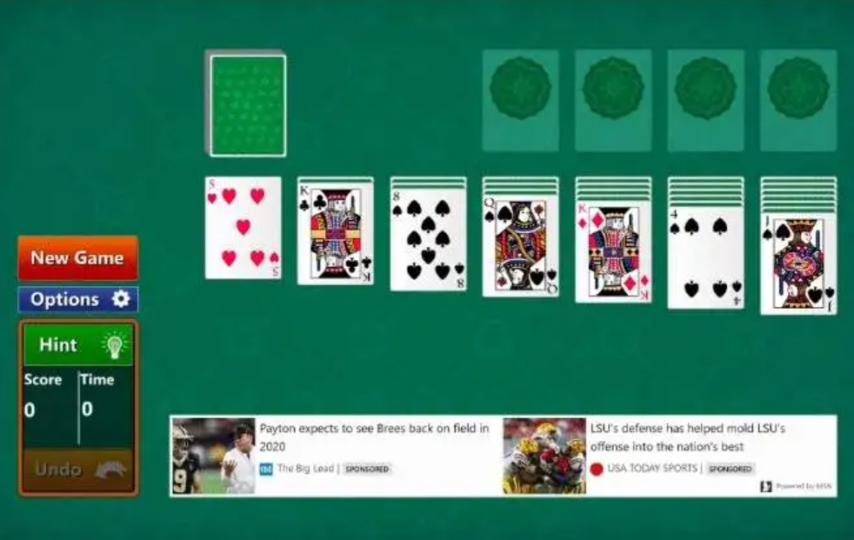Solitaire, a classic card game that you can play here, has found a new and dynamic home in the digital realm. With the advent of computers and smartphones, various versions of Solitaire have emerged, each offering unique gameplay experiences and challenges, captivating both seasoned players and newcomers alike. What began as a solitary pastime played with physical decks of cards has been reimagined and transformed through technology, bringing a beloved classic into the modern era.
The evolution of Solitaire can be traced back to the late 18th century, where the game’s earliest documentation is found in literature. Over time, Solitaire evolved and adapted across different regions and cultures, captivating players with its blend of strategy, skill, and patience. However, it was Microsoft’s inclusion of the game in Windows 3.0 in 1990 that catapulted Solitaire into a worldwide phenomenon. As personal computers became ubiquitous, millions of users found themselves drawn to the digital version of this age-old game, introducing it to a whole new generation of players. The allure of Solitaire was further amplified with the advent of smartphones, which turned it into a pocket-sized obsession, allowing players to indulge in a quick game during a commute, a break, or a quiet moment of leisure. Today, Solitaire stands as a testament to the enduring appeal of traditional games in a rapidly evolving digital landscape, and its various iterations on computers and smartphones continue to delight and challenge players around the globe.
Evolution of Solitaire
The origins of Solitaire can be traced back to the late 18th century when the game was first documented in literature. It evolved over time, and by the 19th century, it became a popular pastime in Europe. However, it was Microsoft’s inclusion of the game in Windows 3.0 in 1990 that catapulted Solitaire into a worldwide phenomenon. Since then, various digital versions of the game have been developed for both computers and smartphones.
Classic Klondike Solitaire
The most well-known and widely played version of Solitaire is Klondike Solitaire, also known simply as “Solitaire.” This classic variant involves dealing cards into several columns and revealing them one by one, with the goal of arranging them in descending order while alternating colors. The game has different rules, such as dealing from a stockpile or drawing three cards at a time, which can significantly impact the difficulty level and strategy required.
Spider Solitaire
Another popular variant, Spider Solitaire, was introduced in Windows 98. The game is known for its challenging gameplay and requires players to create sequences of cards of the same suit in descending order. With multiple difficulty levels and variations, Spider Solitaire has become a favorite among players who enjoy more complex and time-consuming challenges.
Freecell Solitaire
Freecell Solitaire is a unique version that gained popularity through Windows operating systems. Unlike Klondike or Spider, all cards are initially dealt face-up, giving players the advantage of knowing the entire layout from the start. The game is renowned for its strategic depth, as almost every deal is theoretically solvable. This version appeals to players who enjoy a blend of skill and logic.
Pyramid Solitaire
Pyramid Solitaire is a lesser-known but equally intriguing variant. The game is played using a pyramid-like arrangement of cards, and players aim to remove pairs of cards that add up to a total of 13. This engaging and addictive version has found its place on both computers and smartphones, captivating players seeking a different kind of challenge.
Solitaire on Smartphones
The rise of smartphones brought a revolution to the gaming industry, including Solitaire. Game developers quickly recognized the opportunity to bring this timeless game to handheld devices, making it accessible anytime and anywhere. Mobile Solitaire applications offer various versions and customizable themes, making the gaming experience even more enjoyable.
Social and Competitive Aspects
With the advent of smartphones and app stores, Solitaire games have not only evolved but also incorporated social and competitive elements. Online leaderboards, achievements, and daily challenges are features that encourage players to compete with friends and players worldwide, enhancing the sense of community and keeping the gameplay engaging and fresh.
Microtransactions and Advertisements
While Solitaire games on computers were mostly available for free, smartphone versions often rely on microtransactions and advertisements to generate revenue. This approach has received mixed reactions from players, with some finding the ads intrusive, while others appreciate the opportunity to support the developers through in-app purchases.
Impact of Technology on Solitaire
The digital transformation of Solitaire has significantly impacted the way people play the game. The convenience of playing on computers and smartphones has expanded the player base, making Solitaire accessible to people of all ages and backgrounds. The integration of advanced algorithms also allows for more complex and diverse game variants, ensuring that players never run out of challenges.
Future of Solitaire in the Digital Era
As technology continues to evolve, so will the Solitaire gaming experience. Developers will likely explore new ways to enhance graphics, user interface, and social interactions, further integrating the game into the digital world. Moreover, emerging technologies like virtual reality (VR) and augmented reality (AR) could introduce innovative ways of playing Solitaire, immersing players in captivating virtual environments.
Summing Up
Solitaire’s journey from physical card decks to digital platforms showcases how technology can revitalize and revolutionize classic games. The plethora of versions available on computers and smartphones caters to diverse preferences, ensuring that Solitaire remains an evergreen favorite for players worldwide. As technology continues to advance, it will be exciting to witness how Solitaire evolves further, captivating new generations of gamers while retaining its timeless appeal.








